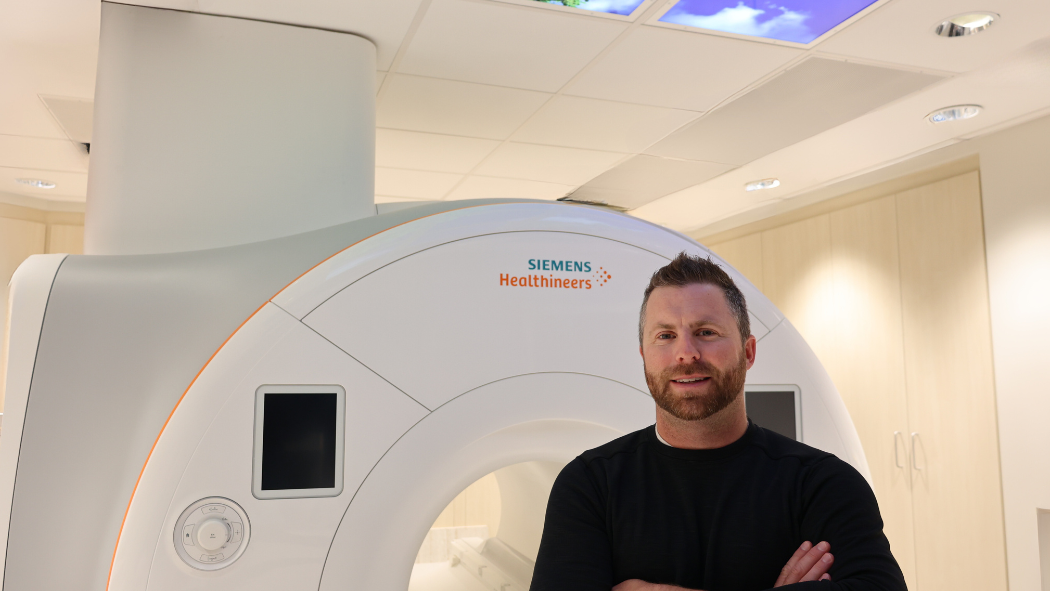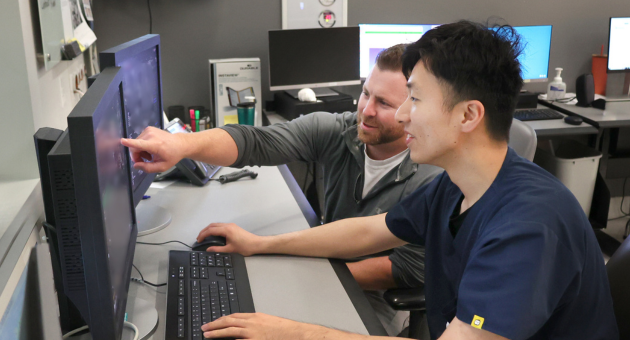
August 14, 2024
By Chad Carnegie, Medical Radiation Technologist
MRI technologists at LHSC
As a Medical Radiation Technologist (MRT) specializing in MRI, our role is crucial in the diagnostic process, safely operating scanners and ensuring high-quality patient care. We witness patients throughout their entire treatment journey and see firsthand the profound impact our team has on their lives, from the initial stages before diagnosis, through their treatments, and in follow-up appointments.
Becoming an MRT
During my time in high school, I had the opportunity to visit the radiology department at London Health Sciences Centre (LHSC). This experience sparked my career journey, which began at Fanshawe College in the Pre-Health Sciences program. Unsure of my path at 18, the program exposed me to various health-care fields, ultimately leading me to the MRT program.
After completing my clinical placement, I joined the LHSC team and spent eight years working in the general X-Ray department, Cardiac Catheterization Lab, and CT (Computed Tomography). Upon securing a full-time position in CT, I pursued additional schooling in the MRI program, which has been my focus for the past decade.
I was initially drawn to medical imaging for two primary reasons:
- patient care and
- technological advancements.
Patient care:
The aspect of patient care is central to my role. As a MRI technologist, I have the privilege of directly interacting with patients, particularly with the elderly. I find great fulfillment in listening to their stories and learning from their life experiences.
Technological advancements:
I am passionate about working with technology and anticipating future advances in the field. In MRI, we are directly involved in the patient's care journey, as MRI tests can be challenging for many. Our team strives to ensure the experience is as comfortable and efficient as possible. It's always rewarding to hear patients say, "That was not as bad as I thought."
Technological advances in MRI
One of the most rewarding aspects of working in medical imaging, especially in MRI, is the continuous advancements in technology. These innovations allow us to enhance diagnosis and significantly improve patient outcomes.
A MRI’s designation is based on the strength of the magnet, its strength measure in Tesla (T). We have recently replaced the entire fleet of MRIs at LHSC and now have five MRIs in total including:
- Two 3T MRIs
- Two 1.5T MRIs, and
- One 0.55T MRI which is the first of its kind in Canada
With our most recent MRI, the MAGENTOM FreeMax 0.55T MRI, we are also making use of some really neat AI programming to help us provide care.
At LHSC we are working to develop new protocols and procedures for different areas including cardiac, neurology, abdominal and pelvic, and orthopaedics. Through these developments we can assist in quicker diagnosis and treatments for our patients.
Helping train new technologists

In addition to my role as a MRI technologist, I am currently coordinating students at University Hospital from various college programs across Canada like Mohawk, Michener and Northern Alberta Institute of Technology (NAIT). We provide students with the opportunity to use new technology and learn from our highly experienced and knowledgeable MRI technologists. Personally, I enjoy watching the students grow and become independent MRTs, equipped with the confidence they built with the team at LHSC.
Are you interested in growing your career at LHSC? Check out current opportunities online or connect with the Recruitment Team recruitment@lhsc.on.ca to learn more.
